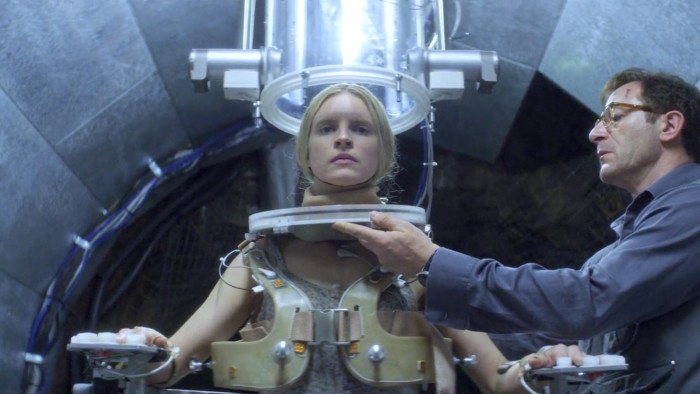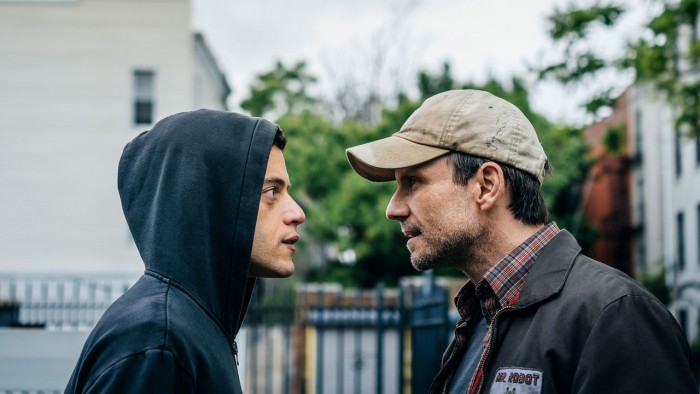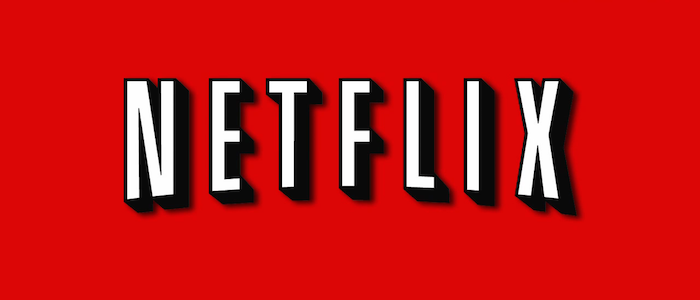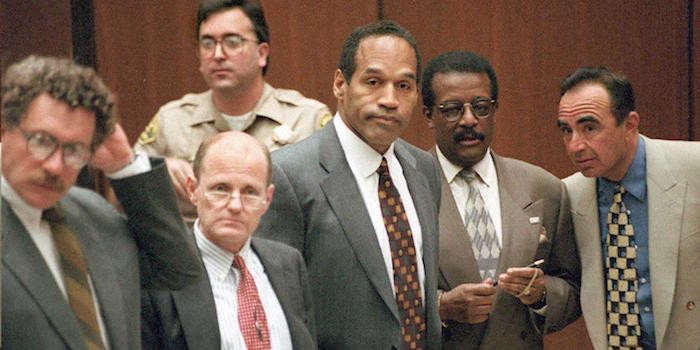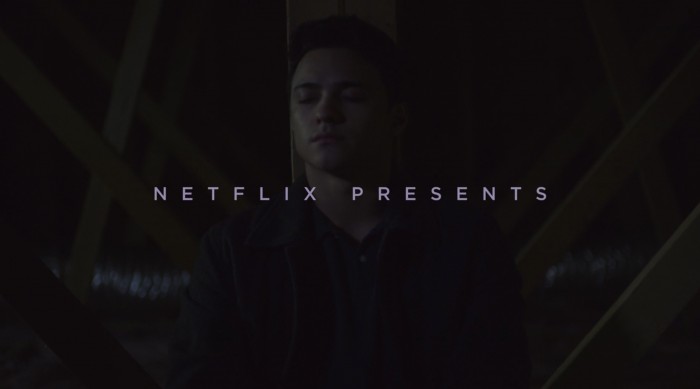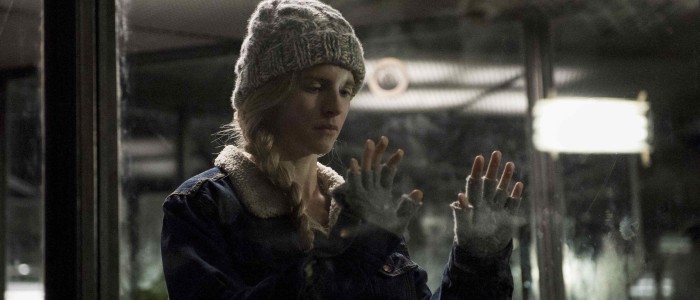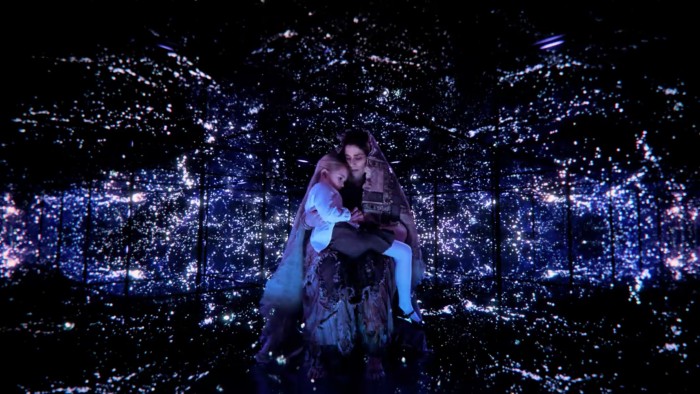How 'The OA' Is The Next Evolution In Television Storytelling
Netflix's new series The OA is one of the most interesting television shows of 2016. And while I'll agree that the series is not for everyone, it's hard to deny that the show is pushing the boundaries of television storytelling. In fact, I believe The OA is an example of how television storytelling will evolve in the world of cord-cutting and premium streaming services.
The Story Determines the Running Time, Not the Other Way Around
Television storytelling has had a dramatic evolution over the last two decades. Premium cable services like HBO have elevated the idea of what television stories could be, DVRs have allowed viewers to timeshift and completely fast forward through commercials (giving a rise to integrated marketing and product placement) while streaming services like Netflix have changed how we consume these shows (binge watching). The result has dramatically changed not only the playing field but the game itself.
I think The OA is notable in the next evolution of television storytelling for a couple of reasons. Let's begin with the show's dramatic use of running times. Some episodes of The OA are 50 minutes, while some are as long as an hour and eleven minutes or as short as a half-hour. The particular story determines the running length of the episode. The OA was written and created by Zal Batmanglij and Brit Marling (who also stars), with the entire eight-episode first season directed by Batmanglij. I was able to talk to Batmanglij over the weekend, and he explained his intentions:
We weren't really trying to do anything too cool for school, we were just very fascinated by the novel, and how the novel could now be done in this format because of the technology. The idea that chapters in a novel would conform to 50 pages each is a ludicrous concept. I guess in television, there is a very clear-cut reason for that, and that is capitalism. I think that when you remove the capitalistic restraints... The beauty of Netflix is, there job is to put stories out there, and not stories that appeal to everybody, which is maybe NBC's job? And if you're a storyteller your job is to tell a story. We didn't feel the traditional constraints of capitalism — we weren't trying to sell a car and tell you a story.
The Ever Expanding TV Show Running Times on Cable
Traditionally, television has been an advertisement-run business. Mr. Robot creator Sam Esmail explained to me how this new mindset has changed the way stories are told on television:
That first viewing of a given episode was everything. Consequently, a rigid schedule and format were extremely important. Nowadays, non-linear viewing such as DVR/streaming has created new demands by viewers seeking quality content free from the limitations of schedules. This caused the business model to expand, and networks began seeing a lot more value in their libraries post live airings. That shift paved the way for a revolution in TV storytelling that we've been seeing unfold the past decade, allowing the creative to make the call on a lot of things, including runtime.
You may have noticed in the past few years that many hour-long television shows have occasionally broken through the containment of their grid scheduling. While it had not been uncommon for a series to have a double-length season premiere or finale, now we're starting to see occasional episodes which overrun the traditional one-hour timeslot.
For instance, Mr. Robot has occasionally gone over the usual 42-minute running time. Esmail tells me that his show always aims for the traditional 50-page count due to their production schedule, but it is only after editing that they start to get a realistic sense of the runtime. He explains how this happens with an example of the Mr. Robot's 62-minute pilot episode "eps1.0_hellofriend.mov":
This was my first time and I was told to expect to find a way to cut it down to the traditional 42. I believe at the time so many things were considered– the entire server farm sequence was on the chopping block at one point. I even think the fuck society speech was potentially going to get cut and maybe moved to the second episode. But ultimately I felt so good about it that I just showed the network the cut as is and asked them what they thought. They loved it so much that I think that's when we started to say we can break our runtime targets if the episode deemed it necessary.
In the last few years, cable networks like USA, FX, and AMC have been giving showrunners this leeway while broadcast networks have a more strict adherence to the traditional runtime.
Why This Can Only Be Done On Netflix
But what The OA is bringing to the table is something that is unique to the streaming television revolution. Batmanglij explains why what they are doing can only be done with shows actually produced by a streaming company like Netflix:
And I think this is really important: even shows that aired on Netflix couldn't do this because they were made by an outside company, like MRC makes House of Cards. So MRC might want to sell the rights to that show to Sky TV one day, so they have to still be in a format that's sellable for broadcast television. The beauty of The OA or Stranger Things is that they are both made by Netflix for Netflix. And so there was a freedom all of a sudden that matched our intention. We wanted to do this from the get-go and it was just one of these great marriages where what we were interested and what they were interested in just happened to align.
Stranger Things season one confirmed strictly to the traditional hour-long runtime, with episodes ranging from 41 to 55 minutes. But Batmanglij and Marling had always intended to tell their story over a set of chapters of varying length. When they signed up with Netflix, they agreed to do eight episodes because that was "the most we thought we could do" with Zal directing all of them.
Cary [Fukunaga] directed all eight True Detective, and we were not only going to try to do that, but also write them all. So it was a huge undertaking. So then I guess we thought an hour of television is really fifty minutes, right? So eight fifty-minute episodes, that's pretty much the running time of the whole thing, just divided differently.
The length of the episodes was determined at the script phase; it was not a result of editing. Netflix never gave them any notes about the running times. I love the idea that the television shows of the future could have a twenty-minute episode to tell a smaller story or a ninety-minute episode to focus on a more epic installment. It's interesting here that The OA's shortest episode (Episode 6: "Forking Paths"), which is a half-hour long, doesn't feel like it's smaller in any way. The length feels necessary for this installment of the overarching story.
Some Stray Thoughts About TV Show Running Times
Esmail believes that a showrunner's responsibility is to "tell the most compelling story you can" and "though it's important to keep that story as tight as possible — that actually means nothing when it comes to the runtime length."
For example, OJ: Made in America was told in taut and enthralling 90-minute episodes. Some shows can even run long or short from week to week with no set or approximate runtime format. Horace & Pete is a good example of that. I know that critics and journalists often complain of long runtimes and I'm not sure I get it. A thrilling 2-hour episode of TV can be great just as easily as a boring 23-minute episode can be terrible. The runtime is a meaningless measurement, especially for quality.
Some web series have played around with extremely variable runtimes. Esmail mentions Horace & Pete, which was created, written, directed and self-funded by Louis C.K., which had runtimes spanning from 67 minutes to as few as 30. But The OA is the first television series I know of that has taken this approach.
Only One Title/Credit Sequence
Another way The OA is pushing the format of television series is that it only has a title/credit sequence once. Batmanglij says:
A big thing for us was, let's just do the credits once. I love watching House of Cards. Let's use House of Cards as an example. I actually like everytime when that music comes on and those credits come on, but it feels kind of funny, right? I don't think I need the credits everytime I watch the show.
The opening title sequence is something invented out of broadcast television of the channel flipping days. The purpose of a credit sequence on shows created for the binge-watching crowd seems almost pointless to me, although I agree a great theme song can put you in the mood for what is about to come (for example, the Stranger Things credits sequence). But making this change wasn't something that was easy. Batmanglij says that while Netflix supported them, the system pushed back hard.
It's just an archaic thing that is just really hard to change. Even in The OA we had to follow Guild requirements and put directed by and the credits and I'm embarrassed to put my name every time, I mean, who cares: Look it up on the internet if you want to know who made it. And it was inspiring that [Netflix] were so supportive. It's so rare. I can't even explain to you how rare that is.
The OA title sequence comes 57 minutes into the hour-and-eleven-minute pilot as Marling's Prairie Johnson begins to tell her chosen group her backstory. It honestly gave me chills the first time I saw it. Batmanglij admits that they didn't even really plan for it, it just came organically.
It's just how the story goes. I think Brit and I were just talking out the story and I was just like, 'camera pushes in on French's face and it's the boy's imagination of her story... Netflix presents' and you know. My stomach dropped when I said that. I was just saying it on a lark and it's been so great to see other people's stomachs drop. What I didn't expect was some people would be offended by that. That's what has been so hilarious about this process.
My Brief Thoughts on The OA Season One
We've talked a bit about the controversy over the ending of The OA's first season, and you can read comments from Batmanglij and Marling at the linked story. Personally, I really loved the first season of The OA and as you can tell from this article, I think the series is doing some interesting things for the evolving medium of storytelling.
I also think it's bringing a type of story to television that we're more used to seeing at Sundance. I have told almost everyone I know that they must experience the first episode. I always follow up that recommendation with: "but you might not like it." It's certainly not a show for everyone, but I'm sure the people that do connect with it, like me, will end up holding it in high regard.
That said, I was a bit let down by the ending. Not that questions weren't answered. I enjoy how Batmanglij and Marling make us question the reality of the story they have presented. I've followed the pair's careers from their breakthrough Sundance year. I was a huge fan of their debut film Sound of My Voice, which shares some interesting elements with The OA. Batmanglij and Marling are great at world-building, and Sound of My Voice ends on a similar open-ended cliffhanger with the same kind of questions.
I also was not bothered by the school setting of the final sequence. I think the story had delved into themes of unhappiness and bullying enough to warrant this scene. My problem is that this last episode feels rushed in comparison to the rest of the series, which feels so very meticulously planned and executed. Which, yes, I know seems odd coming at the conclusion of an article all about how the show's story determines the running time and not vice versa. To me, it felt like they needed more time in that last episode to conclude this story.
Moving Forward: The OA Season 2
Even though I found the finale to be disappointing, I'm still on board for a second season if Netflix decides to make one. And so I had to ask Zal if they had planned for the second season of this story before approaching the first.
I don't like talking about a second season because its a little bit like putting a car before the horse — it's only been two weeks. But I'll tell you this, Brit and I would not have undertaken this project without having planned it meticulously long before we ever took it anywhere... again, capitalism. Capitalism says if you work in this long format medium, you just throw things to the wall and if something sticks and you get it greenlit, you better make a pilot and once that sticks, you better scramble to figure out how to make 8, 12 or 24 hours of a season. We did not approach it that way. We did not try to sell a pilot and figure it out, sell an idea and then figure it out afterward. I think that's crucial. Brit and I figured out a story we wanted to tell, a story we thought had meaning and value. And I think that's another thing that's similar to a novel, is that we're saying something in this piece. It's not as much of a message as much as it's a point of view, or a thesis. And that's similar to a novel... and I think that's also shaking people a bit. They don't expect that from their binge viewing or one-hour drama.

